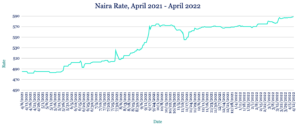WTO warns on food supply risks for Africa
The global hike in food prices caused by Russia’s war in Ukraine could lead to mass hunger in developing countries, especially in Africa, according to the World Trade Organization. With 35 African countries importing food from Russia, Ukraine or both, and another 22 importing fertiliser from those countries, the WTO warns that wheat prices could rise by up to 85% without intervention. Some African nations are already taking steps to limit the impact.
Nigeria has approved the use of its strategic grain reserves while South Africa is preparing to increase its exports of maize to plug any supply shortages.
Meantime, ambassadors from France, Italy, Portugal and Spain have met with the Nigerian National Petroleum Corporation about boosting Nigerian gas supply to Europe to help reduce the EU’s reliance on Russian energy.
Naira slumps to new dollar low
The Naira slid to a fresh record low against the dollar on the unofficial market this week, depreciating to 589 from 587 at last week’s close.

That weakness came as President Muhammadu Buhari petitioned the Nigerian Senate to increase the country’s fuel subsidy to NGN3tr from NGN442bn to counter the recent spike in crude prices.
Buhari also this week approved distribution of 40,000 metric tons of assorted grains from the country’s strategic reserves to cushion the impact of higher food prices amid Russia’s war in Ukraine. Given the impact of inflation and increased FX demand, we expect sustained pressure on the Naira in the coming days.
Record weak Cedi faces further depreciation
The Cedi tumbled to a fresh low this week, resuming its recent slide against the dollar to trade at 7.63 from 7.53 at last week’s close amid concerns about the country’s finances.

As the government prepares to introduce its controversial digital tax in May, mobile money transaction volumes declined, undermining the government’s ability to generate much-needed revenue through the E-levy.
In an effort to cut unbudgeted government spending, the Ministry of Finance said it would partner with the Public Procurement Authority to automate procurement and prevent overspend. Given higher food prices and the impact on inflation, we expect to see further depreciation for the Cedi in the coming days.
Metals uptick to keep Rand’s gains
The Rand strengthened against the dollar this week, trading at 14.54 from 14.66 at last week’s close as rising commodity prices, particularly precious metals, boosted the currency.
Expectations of further monetary policy tightening by the South African Reserve Bank and a more optimistic economic outlook also supported the Rand.

While the country is benefiting from the broader rise in commodity prices as a result of Covid-19 supply disruptions and Russia’s war in Ukraine, higher inflation due to increased energy and food prices remains a major risk to South Africa’s economy.
Given those balancing factors, we expect the Rand to hold firm at these levels in the coming days.
Inflation pressures weigh on Egyptian Pound
The Pound weakened against the dollar this week, sliding to 18.5 from 18.3 at last week’s close as inflation jumped to 12% in March from 10% in February amid Russia’s ongoing war in Ukraine.

Inflation was driven higher by the rising costs of grain, bread, poultry, seafood and dairy products. Given these inflationary pressures coupled with capital outflows we expect to see further depreciation for the Pound in the coming days.
Kenya may raise debt ceiling amid new low for Shilling
The Shilling was slightly weaker against the dollar this week, touching a record low 115.66 before recovering to 115.39, compared with 115.33 at last week’s close. Rising food prices pushed inflation to 5.56% in March from 5.1% in February.
The Kenyan Treasury Cabinet Secretary Ukur Yatani this week tabled a proposal to raise the debt ceiling for the coming financial year to 55% of GDP.

That would give the government more room to ease growing spending pressures as a fuel shortage continues to affect key sectors, with some petrol stations not having enough fuel to meet demand.
Against that backdrop, we expect sustained weakness for the Shilling in the near term.
Ugandan inflation sets Shilling for further falls
The Shilling depreciated against the dollar this week, slipping to 3517.65 from 3456.51 at last week’s close.
That came as inflation ticked up to 3.7% in March from 3.2% a month earlier as supply chain disruptions pushed commodity prices higher.

Uganda’s central bank held its benchmark interest rate at 6.5%, citing an improved economic outlook as the impact of the pandemic fades and the country’s economy fully reopens.
However, given ongoing inflationary pressures, we expect to see more weakness for the Shilling in the near term.
Tanzania bucks inflation trend helping Shilling
The Shilling strengthened marginally against the dollar this week, trading at 2321.55 from 2322.32 at last week’s close, with Tanzania bucking the regional trend and seeing its inflation rate fall in March to 3.6% from 3.7% in February.











